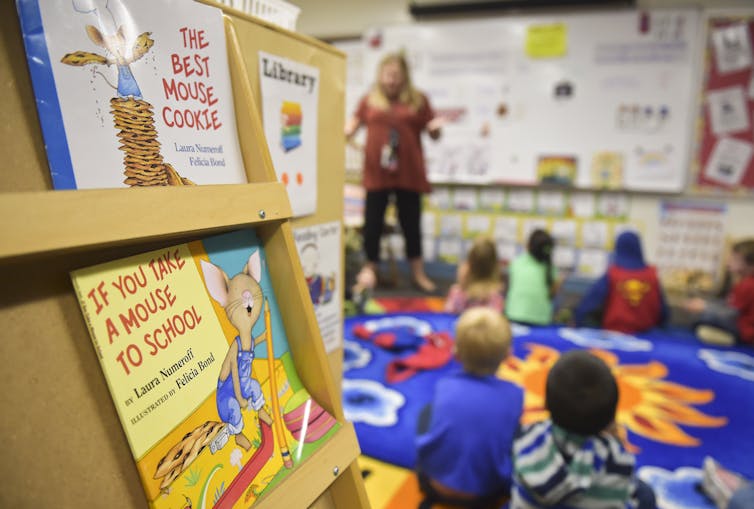Education
One in Four Early Childhood Educators in Colorado Report Mistreatment

A recent study revealed that approximately 25% of early childhood educators in Colorado reported experiencing mistreatment from colleagues within the past year. Conducted across 42 Head Start centers in the Denver metropolitan area and southeast Colorado, the research highlights serious concerns about workplace conditions that could impact the educators’ ability to provide quality care for children under the age of five.
The study, led by a clinical associate professor and a research assistant professor in public health, surveyed 332 early child care educators and staff. It found that 15% of these professionals experienced multiple forms of mistreatment, including discrimination based on race, ethnicity, age, and gender as well as bullying and harassment. Such negative experiences have been linked to increased days of poor mental health among educators, who reported an average of seven poor mental health days in the month prior to the survey.
Impact of Mistreatment on Educators and Children
Early childhood educators play a crucial role in shaping the development of young children. According to one educator, “We have little people that depend on us. Parents depend on us, and we need to make sure that we are there for the kids when they need us.” Yet, the mental stress stemming from workplace mistreatment can hinder their ability to form positive relationships with children, thereby affecting the children’s overall development.
The study indicates that mistreatment is not only prevalent but has a profound impact on the mental health of educators. The findings reveal that early childhood educators report higher rates of depression compared to the national workforce. The high-stress environment often drives some educators to leave the profession altogether, exacerbating the already critical shortage of qualified staff.
Additionally, the research uncovered that 1 in 4 early childhood staff experienced condescending or demeaning treatment from colleagues in the past year, making it the most common form of mistreatment reported. Such behavior can strain vital teamwork and collegiality, which are essential for maintaining a supportive work environment.
Discrimination and Its Consequences
Discrimination in the workplace remains a significant issue, with 10% of early childhood staff reporting experiences of discrimination tied to race or ethnicity. This form of mistreatment adversely affects not only mental health but also an individual’s job satisfaction and engagement. Notably, younger educators, particularly those aged 18-29, reported instances of discrimination at a rate three times higher than their older counterparts.
The disparity in treatment across different age groups can lead to mistrust and decreased engagement among staff. Younger educators often face perceptions of being less experienced, while older colleagues may be viewed as less adaptable to modern practices. Such biases can create a fragmented work environment, further complicating the already demanding nature of early childhood education.
To improve conditions for early childhood educators, the study emphasizes the need for both societal recognition and organizational change. Currently, the average annual salary for a U.S. preschool teacher stands at $37,120, significantly lower than the $63,680 earned by elementary school teachers. This wage gap contributes to high turnover rates in early childhood education, which are four times higher than those in elementary education.
One educator remarked, “Turnover has a lot to do with pay, unfortunately, and we don’t get paid a whole lot of money. I don’t think I’ve always felt valued in the position I’m in.”
Strategies for Improvement
The study advocates for the implementation of health-centered policies and managerial training aimed at fostering supportive team environments. Interventions like the Total Worker Health program focus on the holistic well-being of workers, addressing both physical and mental health concerns. In Colorado, the WELL Program has demonstrated success in improving workplace culture and staff well-being through training in mindfulness and stress management.
As the early childhood education sector grapples with these pressing issues, further research into generational differences in workplace communication and perceptions of mistreatment is essential. Understanding these dynamics may help in developing more effective strategies to combat mistreatment and improve the overall work environment for educators.
The findings of this study are crucial not only for educators but also for parents and policymakers who aim to enhance the quality of early childhood education. Acknowledging and addressing the issues faced by early childhood educators can lead to a more supportive environment, ultimately benefiting the children under their care.
-

 Technology4 months ago
Technology4 months agoDiscover the Top 10 Calorie Counting Apps of 2025
-

 Health2 months ago
Health2 months agoBella Hadid Shares Health Update After Treatment for Lyme Disease
-

 Health3 months ago
Health3 months agoErin Bates Shares Recovery Update Following Sepsis Complications
-

 Technology4 weeks ago
Technology4 weeks agoDiscover 2025’s Top GPUs for Exceptional 4K Gaming Performance
-

 Technology2 months ago
Technology2 months agoElectric Moto Influencer Surronster Arrested in Tijuana
-

 Technology4 months ago
Technology4 months agoDiscover How to Reverse Image Search Using ChatGPT Effortlessly
-

 Technology4 months ago
Technology4 months agoMeta Initiates $60B AI Data Center Expansion, Starting in Ohio
-

 Technology4 months ago
Technology4 months agoRecovering a Suspended TikTok Account: A Step-by-Step Guide
-

 Health4 months ago
Health4 months agoTested: Rab Firewall Mountain Jacket Survives Harsh Conditions
-

 Lifestyle4 months ago
Lifestyle4 months agoBelton Family Reunites After Daughter Survives Hill Country Floods
-

 Technology3 months ago
Technology3 months agoUncovering the Top Five Most Challenging Motorcycles to Ride
-

 Technology4 months ago
Technology4 months agoHarmonic Launches AI Chatbot App to Transform Mathematical Reasoning





















